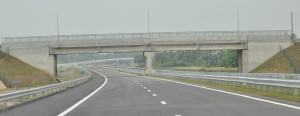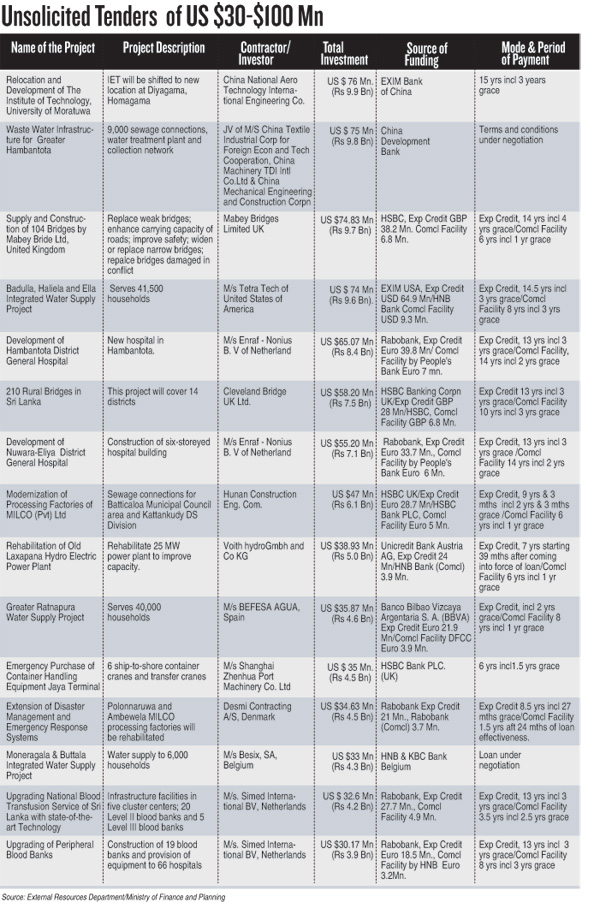News
Unsolicited projects open highway to corruption
At seven billion rupees a kilometre, the new outer circular highway from Kadawatha to Kerawalapitiya had better be worth it. The road is being built by the Metallurgical Corporation of China Ltd at a total cost of US$ 520 million or Rs. 67 billion. It is only 9.3 km in length. Naturally, questions arise about costs. But had this tender been awarded through a transparent and open, competitive bidding process, the concerns might not have been this acute nor the cost so steep.
 Once complete, the highway will include a six-km viaduct, five overpasses and two underpasses. These might be reasons for the astronomical cost. Could we have got it cheaper? Who can tell? There were no alternative bids. The government did not ask for any.Last week, the Sunday Times Insight focused on the United People’s Freedom Alliance (UPFA) Government’s unprecedented fondness for unsolicited proposals. There is global concern that single-source bidding is spiralling in both developed and developing nations, heightening the risk of corruption in an already clouded procurement industry. Conscientious governments have introduced legislation to handle all aspects of procurement, including unsolicited proposals. Sri Lanka attempted to lend some coherence to the system when its National Procurement Agency was still functioning. But in 2008, the NPA was suddenly abolished and its work assigned to the Department of Public Finance under the Ministry of Finance and Planning.
Once complete, the highway will include a six-km viaduct, five overpasses and two underpasses. These might be reasons for the astronomical cost. Could we have got it cheaper? Who can tell? There were no alternative bids. The government did not ask for any.Last week, the Sunday Times Insight focused on the United People’s Freedom Alliance (UPFA) Government’s unprecedented fondness for unsolicited proposals. There is global concern that single-source bidding is spiralling in both developed and developing nations, heightening the risk of corruption in an already clouded procurement industry. Conscientious governments have introduced legislation to handle all aspects of procurement, including unsolicited proposals. Sri Lanka attempted to lend some coherence to the system when its National Procurement Agency was still functioning. But in 2008, the NPA was suddenly abolished and its work assigned to the Department of Public Finance under the Ministry of Finance and Planning.
The situation quickly worsened, official sources said. In 2010, responding to a deluge of projects at various levels, the Cabinet of Ministers appointed a Standing Cabinet Appointed Review Committee (SCARC). The relevant Public Finance Circular gives some insight into the gravity of the problem.“It has been observed that Cabinet approvals are sought and various commitments are being made by line ministries on ad hoc basis relating to stand-alone or unsolicited development proposals submitted by prospective private investors, financiers and promoters, both local and international, extending diverse financial assistance cum project proposals towards implementing development projects,” it reads.
The circular instructs secretaries, heads of department, heads of government corporations and statutory bodies to submit all stand-alone or unsolicited development proposals to the SCARC for assessment. The committee has seven secretaries headed by the Prime Minister’s Secretary S. Amarasekera. Still, even this system is not foolproof.
“We have sometimes had project ministers saying we can bypass the SCARC to which we have responded, no, we want to go through SCARC,” an authoritative source said, requesting anonymity. “I think there is a perception that the SCARC slows things down. But, yes, there is a process on unsolicited proposals and my feeling is that they are trying to get a handle on it.”
The Government has not justified to Parliament a large number of unsolicited proposals that are being entertained at various levels. It might soon have to. It is not just infrastructure developments that are accommodated. Purchases running into billions of rupees are made and service and supply contracts dished out without open competitive bidding.
Commission agents slither along the corridors of power, peddling their clients. Certain private investments — and not others — are separately approved on a priority basis. They receive sweeping tax concessions without sufficient accountability or explanation to the public. Land, it is alleged, is sold for a song. Rules and regulations are bent to facilitate these ventures. Ironically, the Public Finance Circular specifically quotes the 1998 ‘Guidelines on Tender Procedure’ which stipulates that “no decision should be taken solely on the basis of unsolicited offers unless with Cabinet approval to deviate in exceptional circumstances”. Everything, it would seem, is an “exceptional circumstance” now.
The Colombo Port City Project is now at the centre of controversy. The opposition is objecting to the contract which was awarded to China Communication Construction Company (CCCC) without tender. The company says it will invest US$ 1.4 billion in reclaiming from the sea and developing 233 hectares of land.
Interestingly, CCCC is a holding company under China Harbour Engineering Company — a commercial entity that has already clinched several mega projects in Sri Lanka. These include the Hambantota port; the Mattala airport; the US$ 412 million (Rs. 53bn) expressway between the Hambantota port and the Mattala airport; and the more extravagantly priced portions of the Colombo-Matara Expressway. It has also signed up to build a resort in Mattala. That is an awful lot of deals for one company.
Treasury Secretary P.B. Jayasundera in a recent interview with the Sunday Times regretted that “politicisation is a problem”. Supporters of the Government’s development model rightfully say that the postwar landscape of Sri Lanka has changed dramatically. Electricity, water supply, roads and transportation have received priority and, unsolicited or not, the effects of mega projects are being seen and felt.
“We have to look at the choices,” Dr Jayasundera said. “We have the World Bank and ADB routes but the question is whether or not their resources will permit this much public investment. The other is the privatisation route. The Government doesn’t accept the privatisation route per se for capital provision.”“The next question is, do we turn to Export Import Banks,” he continued. “If they are credible, if they have the capacity to fund large projects, if the terms and conditions are acceptable and if the cost-benefits are properly done, that is the way forward. Many countries have moved in that direction.”
But this is also where the problem lies. A large number of professionals the Sunday Times interviewed over a three-week period are doubtful whether “the terms and conditions are acceptable” or whether “the cost-benefits are properly done”. Far too many affected parties say many a deal can be closed if “you know the right people” and “if the fringe benefits are right”.



